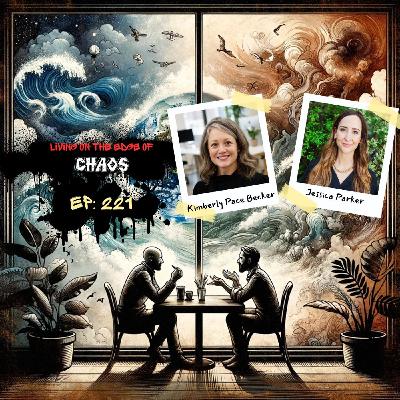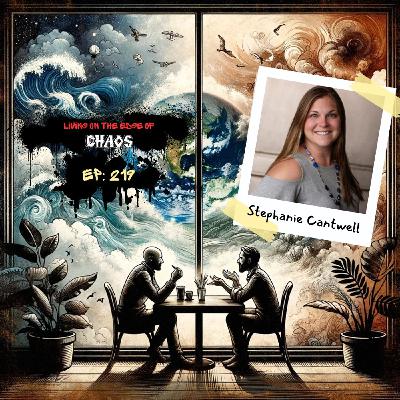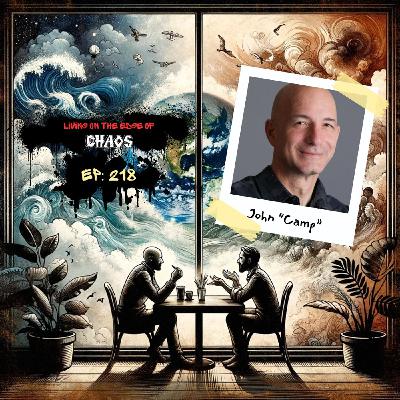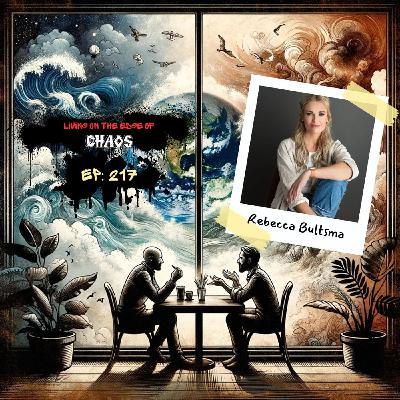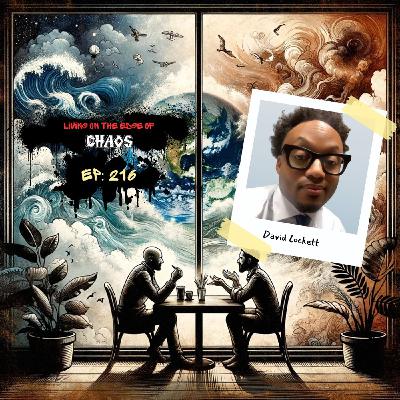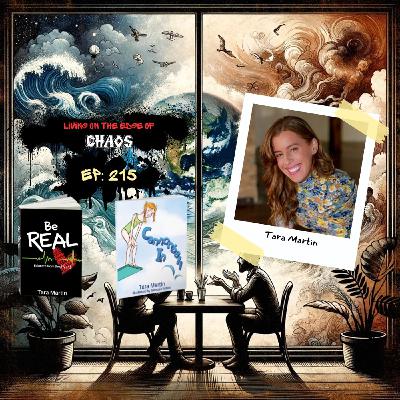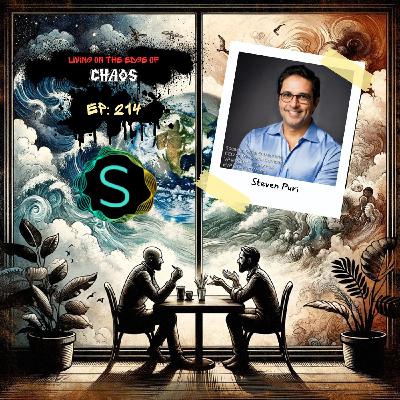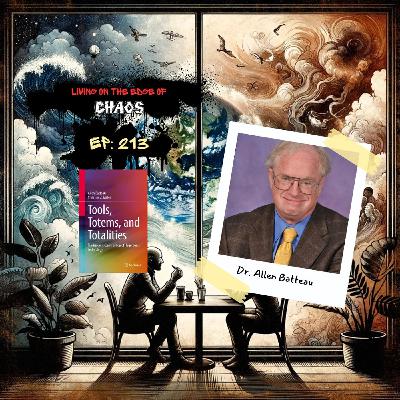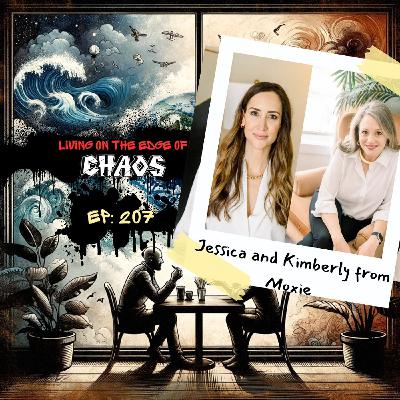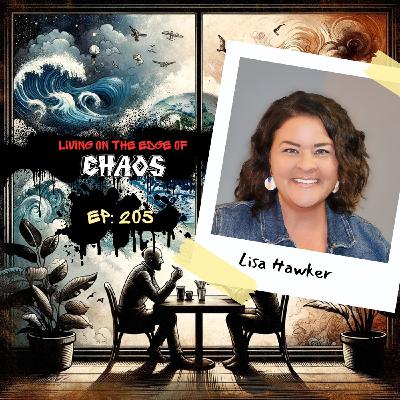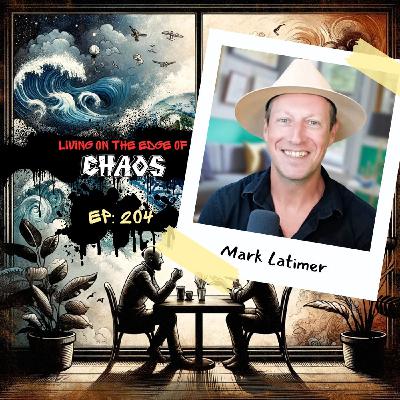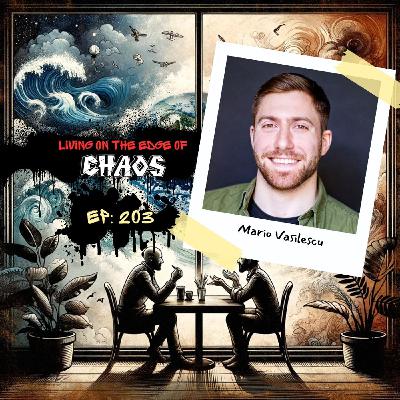Discover Living On The Edge of Chaos
Living On The Edge of Chaos

Living On The Edge of Chaos
Author: Aaron Maurer
Subscribed: 13Played: 1,779Subscribe
Share
Description
“Living On The Edge of Chaos,” hosted by Aaron Maurer, is a podcast that takes listeners on an intellectual journey through various facets of education and technology. The show features conversations with experts and innovators like Kevin Eastman, former assistant coach for the Boston Celtics to Lori Mazor, who enlightens on the fusion of Artificial Intelligence and creativity, Brittany Blackwell, who discusses educator burnout and mental health, and Laura McBain, exploring the intersections of design and learning. Through these dialogues, listeners are provoked to ponder on the unfolding narrative of education, making it a unique platform for those curious about the evolving educational landscape.
Grab your cup of coffee and join the convo!
Grab your cup of coffee and join the convo!
229 Episodes
Reverse
Access the ShowAll platforms & past episodes: https://coffeeforthebrain.com/podcasts/Direct Link to This Episode: Listen & Subscribe:[Apple Podcasts] | [Spotify] | [YouTube] | [Simplecast]Episode HighlightsRevisiting Moxie and how closing it deepened their understanding of AI, ethics, and learningThe balance between innovation and honesty when your business depends on what you critiqueHow technical knowledge led them from excitement to skepticismMoxie “AI Sandwich” workflow and how to use AI to brainstorm and refine while keeping the human in the middleKimberly’s story of watching her husband evolve from using AI for tests to using it to write creative scripts for science studentsThe hidden costs of AI tokens, data, energy, attention, and what it means to “pay the real price”Why the most valuable outcomes of AI may be emotional: motivation, reassurance, and calmRethinking productivity: what if being “more efficient” isn’t the goal?QuotesOn understanding AI as novice vs. expert....you can't think critically about something unless you are already an expert, unless you have some level of expertise. There came a point where we were experts enough to see… to think critically enough to say, oh, whoa, wait, hold up, hold up.What is it worth to you?....what would I be willing to pay if I had to pay the true cost of this? Because right now, our use of AI is fully subsidized by venture capital and these big tech companies. But if you had to pay the full cost of what that interaction was, if it's $75, would you pay for it?Power of Choice....what are you saying no, and what are you saying yes to? And not just in terms of financial, but all resources. Time, energy, serenity. I think about serenity as a resource for me, because I need to refill my cup. I cannot just be a yes girl, because I somehow ended up one.....what are you willing to pay for in all the different ways we pay for things, and are you saying yes to too many things?Mirage of Productivity to Save TimeAnd it's just crazy to think that this is gonna give us more time, and we're gonna be more productive and more efficient. No, you're just gonna get a new task......this mirage of we'll reach so much productivity that we'll have a leisure class, it'll be a four-day work week. It's never happened, and what do you know? It's not going to happen, because that is not the culture and the system that we are in, which prioritizes growth at all costs, no matter what.ResourcesEpisode 207: The Importance of Good Writing, Curiosity, Bravery, and the Process of LivingPractical AI for Educators PD for Higher Education Session 3 Breakout With KimberlyJessica on LinkedInKimberly on LinkedInLink: AI Sandwich Graphic by MoxieBook: Empire of AISubstack: Women Writin' 'Bout AIPodcast: Women Talkin' 'Bout AISupport the ShowIf this conversation helped you pause, reflect, or think differently about AI and learning, please share it with a colleague or friend. Leaving a review or tagging the show helps others discover these important conversations.
Access the ShowAll platforms & past episodes: https://coffeeforthebrain.com/podcasts/Direct Link to This Episode:Listen & Subscribe:[Apple Podcasts] | [Spotify] | [YouTube] | [Simplecast]Episode Highlights Clare shares how a career in behavioral and neuroscience research led her to question whether her work truly served the world and how that moment of disconnection sparked a master’s in Applied Positive Psychology and a deep dive into curiosity interventions.She explains the science behind curiosity and well-being like how curiosity broadens perspective, strengthens creativity, and helps us find meaning and purpose.Clare describes creating “Curiosity Thursdays”, unpaid days dedicated to exploration and learning and how intentional time for curiosity fuels new thinking.The conversation explores balancing curiosity with productivity: scheduling curiosity intentionally, matching brain energy to task type, and building rhythms like “Wonder Wednesday” meetings to re-ignite collective wonder.Clare unpacks top-down vs. bottom-up curiosity and purposeful learning versus open, unstructured noticing and why both are essential for creativity and growth.She discusses the intersection of curiosity and AI, including how awareness and questioning keep our brains engaged rather than passive.Clare introduces her Curiosity Sprints that are two-week experiments inspired by Agile thinking designed to make learning iterative, joyful, and evidence-based.We reflect on how curiosity can help redefine success, shift from “achievement” to “enjoyment,” and re-learn the lost art of being bored.Featured QuotesOn the necessity of intention“I had to intentionally carve out that time, because otherwise something more important would always be there. There has to be an aspect of intentionality around curiosity in the world we live in today.”On balancing curiosity and efficiency“I’ve given myself permission, and I’ve actively chosen to be curious. Know the importance of it, be purposeful about it—and then schedule it into your day.”On curiosity and AI“Curiosity actually amplifies memory. So if we can ignite our curiosity before we go in and ask a question of an AI, we’ll remember more and learn more deeply.”On slowing down and not being busy“We are so busy all the time that we don’t really have any hobbies, or we don’t know what our hobbies are anymore. And it’s like, I don’t know how you find that when you’re always busy—you can’t listen, you can’t hear, you can’t find that creativity that’s bubbling up inside you.”On redefining success“I stopped asking, ‘What do I need to achieve this week?’ and started asking, ‘How can I make this week as enjoyable as possible?’ It was a shift from achievement to enjoyment—and it changed how I lived each day.”On curiosity as practice“When I wanted to make changes in my life, I didn’t know how. I just turned them into two-week sprints and figured it out. It’s empowering—because you’re building confidence in your own ability to learn and grow.”Resources & LinksClare Inkster on LinkedInThe Curiosity ExperimentThe Curiosity Experiment on InstagramResearch and studies on amount of questions we ask through the agesClare email address clare@thecuriosityexperiment.co.uk.Global Curiosity Institute website to measure curiosity https://www.globalcuriosityinstitute.com/diagnosticsYour Brain At Work BookTop Down vs. Botton Up Processing Video or ArticleMIT Study: Your Brain on ChatGPT and Clare LinkedIn Post That Inspired My QuestionBlog post about sprintsSatya Nadella article on culture of learn-it-allsSupport the ShowIf this episode helped you, share it with a colleague and leave a review. It helps more educators and leaders find the show.
Episode Highlights Stephanie shares how family vacations to Disney sparked her early love for travel and curiosity about the world.She explains how formative middle and high school trips inspired her to create unique, personalized travel experiences through her company, Lost in Adventure Travel.The conversation explores how travel builds empathy and human connection by meeting people, hearing their stories, and seeing everyday life in different cultures.Stephanie discusses how being a parent influences her approach to accessible trip planning, focusing on visual schedules, pacing, and flexibility so every traveler can fully participate.Both reflect on the importance of downtime and moments of rest during travel, recognizing that learning and reflection often happen in those quiet spaces.She talks about concerts and live music as experiences that bring people together, reminding us of our shared humanity.Featured QuotesWhy travel mattersWe as humans have a tendency to live inside our own echo chambers, and when we push ourselves beyond our comfort zone, which travel really can do, whether it's stepping on the airplane, getting on the train, just leaving our homes sometimes can be scary. It challenges our mindset, it challenges our bodies physically sometimes, it expands our worldview, it allows us to meet people that aren't just like us....it's really important to try and understand where other people are coming from, mindsets, like, physically, where do people live? How is it different than what my house looks like? How is it different than how I was raised?Power of a Guide....guides are the storytellers of the destination. Guides, I think, make or break a vacationCreating Wanderlust LocallyAllowing yourself to go out and try a new restaurant. Try, like, go for a hike in a place you've never been. Those kind of experiences help drive the wanderlust as well, and allow us to step outside of that comfort zone a little bit.Challenge for Living..don't be afraid to take that first step. Whether you are traveling to Asia, or you're exploring your town, going to the concert that you wanted to go to, allow yourself to have the human experiences.Challenge for Immersion...allow someone to tell you a story about where you live about the town next door, go to a museum. Allow yourself to take the tour. Don't… just be your introverted self. Don't just grab your phone and learn about it, but go out there and talk to these people. And, I just think that overall, we will be better off.Learn MoreStephanie on LinkedInLost in Adventure TravelSuggested Past Episodes215: Born to Jump — Tara Martin on Courage, Story, and Self-CareWhy it fits: Courage and story as catalysts for change which are the same muscles you need to launch travel experiences or classroom micro-adventures.214: From Independence Day to Interdependence — Steven PuriWhy it fits: Designing work that prioritizes culture, presence, and curiosity is perfect framing for travel as community-building.104: Estella Owoimaha-Church — Building Empathy through the ArtsWhy it fits: A deep dive on empathy and restorative practices; complements this episode’s theme of travel as perspective-taking.
What We Talk About Camp’s path to NEIA and why he still teaches while leading (modeling the work)Courage as the catalyst for change in any system, at any scaleCompetency-based assessment as a school-wide skill map (transfer across humanities, science, math, Innovation Studio)“Linear school” in a nonlinear world and how AI can help us blow up the old schedule logicWalking the fine line: college-prep and “what-comes-next” prep (love this framing)Keeping innovation alive after year 1: support systems, permission to try (and fail), and tapping teacher passionsWorkflow talk: using ChatGPT to organize brainstorms; Google Classroom paired with “Otis” for competencies; protecting life balanceTeach what can’t be AI’d: discourse, idea-to-idea connection, and real human presence in the roomOne small “ruckus” for tomorrow: break the pattern with a 10-minute gallery walk or other quick shift that re-energizes learningAccess the ShowAll platforms & past episodes: https://coffeeforthebrain.com/podcasts/Direct Link to This Episode: Listen & Subscribe:[Apple Podcasts] | [Spotify] | [YouTube] | [Simplecast]Resources & Links Tiny Experiments BookNEIA Profile: John Camp: https://neiacademy.org/team/john-camp/Camp on LinkedIn: https://www.linkedin.com/in/campsm/Neil Postman, Amusing Ourselves to Death (referenced in the discussion with link to my blog post)Alpha School: (referenced in AI discussion)Highlighted Posts (good primers for listeners)Why human-to-human discourse beats screen-staring (ties to “teach what can’t be AI’d”).Quick wins to break the invisible rules (small, classroom-level ruckuses).Episode QuoteIf you don’t like something, change it. If you can’t change it, change your attitude. Maya AngelouandWe don’t just think outside the box, we act outside the box. Campand our love for Neil PostmanTeach children something about the art and science of asking questions.Question-asking is the most significant intellectual tool human beings have.Support the ShowIf this episode helped you, share it with a colleague and leave a review. It helps more educators and leaders find the show.
What We Talk AboutRebecca’s journey from communications into AI and ethics research.The moment in 2022 when ChatGPT changed the conversation about AI.Misconceptions: why AI is not a fad, and why it matters for everyone.Quick wins with generative AI from reading terms & conditions to learning through NotebookLM.Her mantra: “Never trust a large language model.” What that means and why human oversight is non-negotiable.The risks of over-trusting AI when it feels “human.”Opportunities in strategy: using AI for pattern-finding, scenario testing, and persona-building.Practical advice for staying safe: separating personal/work accounts and turning off data training.Why experimenting with Claude, ChatGPT, or Gemini is the best starting point.Rebecca’s daily workflow: from AI-powered health stacks to automations that save brainpower.Final advice: control the controllables, start small, and build confidence step by step.Access the ShowAll platforms & past episodes: https://coffeeforthebrain.com/podcasts/Direct Link to This Episode: Listen & Subscribe:[Apple Podcasts] | [Spotify] | [YouTube] | [Simplecast]Resources & LinksRebecca’s website: rebeccabultsma.com (speaking, workshops, resources)LinkedIn: linkedin.com/in/rebecca-bultsma (active posts on AI ethics, policy, comms)X (Twitter): @rebeccabultsma — “AI awe + rational anxiety” stream and resource dropsTikTok: @rebeccabultsma (short takes on AI, comms, and ethics)Instagram: @commsrebecca (communications + AI insights)Highlighted Posts (good primers for listeners)“POV: You’re the ‘AI ethics’ person and not freaking out about LinkedIn’s data use.”Nuanced take on platform data and practical risk framing (great for comms leaders). LinkedIn“Never trust an LLM” in practice.Threads/posts where she pushes for human review, disclosure, and trust-building. Pair with her SchoolCEO feature. ApptegyDefining AI ethics as a philosophical puzzle.Reflective post that shows her influences and systems lens. LinkedInAI learning resources roundup.Shareable list of podcasts, newsletters, books, and courses, great on-ramp for teams. X (formerly Twitter)Webinar: Navigating AI Tools in Schools.Concrete strategies for K-12; sets expectations for ethical adoption and practical wins. risevision.comCourses & Tools Mentioned:OpenAI Academy – Free ChatGPT classesGoogle AI on Coursera – AI 101 courseAnthropic Academy – Free Claude coursesNotebookLM – AI-powered research synthesisThe Boring ReportGPT - JobsGPT by SmarterXZapier - https://zapier.com/ai Episode Quote“Anything you can’t do well, or you feel overwhelmed by have generative AI help you. That’s what it’s amazing for. It can be that external brain when you need it.”– Rebecca BultsmaSupport the ShowIf this episode helped you, share it with a colleague and leave a review. It helps more educators and leaders find the show.
Access the ShowAll platforms & past episodes: https://coffeeforthebrain.com/podcasts/Direct Link to This Episode:Listen & Subscribe:[Apple Podcasts] | [Spotify] | [YouTube] | [Simplecast]Top TakeawaysStart where you are, start small. Reverse engineering and cross‑curricular alignment build admin buy‑in and teacher confidence.Make it hands‑on. Robotics, geospatial data, drones, and art integrations hook curiosity and translate AI into the real world.Bake in ethics and trustworthiness. Teach students to question data flows, wearables, and terms of service without doom and gloom.Broaden participation intentionally. Recruit widely, guarantee tool access, and position students as peer experts to level the field.Use your teacher voice. Join listening sessions, meet reps, ask questions, and shape AI policy and funding.Chapters / Timestamps00:00 – Welcome & why this conversation now01:51 – David’s current roles + new workforce development announcement04:00 – From classroom to national initiatives (Einstein Fellow, 3C at Duke)05:44 – Teacher fears, mindset, and the power of perspective08:31 – NSF AI Institutes (AVO): design, prompts, trustworthiness10:50 – NASA partnerships & a new grant (AI + drones)13:32 – Entry points: reverse engineering; cross‑curricular buy‑in & PD17:20 – Secret sauce: collaboration, robotics + data + art20:55 – Broadening participation: recruiting, access, student experts24:08 – Teaching ethics & trust: classroom modules and what “trust” means26:55 – Wearables, privacy, and reading the ToS28:08 – Policy & advocacy: funding, privacy, and meeting your reps31:57 – Getting started: PLNs (ASCD, ISTE, NSTA, NASA) and vendor curricula35:58 – Teachers: your everyday practice is worth sharing41:39 – Full‑circle moment: Python in MS → PhD data science today44:38 – Where to find David + final adviceNote: Timestamps are approximate based on the raw recording.Resources & Mentions (add links) Meharry Medical College — School of Applied Computational Sciences (SACS) — https://sacsmeharry.org/ NSF AI Institutes Virtual Organization (AVO) — https://aiinstitutes.org/(Overview of all institutes: https://www.nsf.gov/focus-areas/ai/institutes)White House OSTP Listening Sessions (AI Bill of Rights process overview) — https://bidenwhitehouse.archives.gov/ostp/ai-bill-of-rights/listening-to-the-american-people/NASA STEM Engagement — Learning Resources — https://www.nasa.gov/learning-resources/NASA EXPRESS (weekly STEM newsletter) — https://www.nasa.gov/learning-resources/nasa-express/NASA Student Opportunities (HS challenges, programs, field trips) — https://www.nasa.gov/learning-resources/nasa-stem-opportunities-activities/NASA Internships (HS/college) — https://www.nasa.gov/learning-resources/internship-programs/Hands-on NASA STEM activities (technology/aeronautics) — https://science.nasa.gov/learn/lessons-and-activities/Reverse engineering AI in the classroom (ISTE feature on David Lockett) — https://iste.org/blog/building-ai-student-creators-meet-artificial-intelligenceMeharry SACS — Trustworthy AI in Medical Systems (NSF CAP project) — https://sacsmeharry.org/taims/Ethics overview (PDF) — https://sacsmeharry.org/wp-content/uploads/2024/04/2_Ethics.pdfUse case: Ethical & Trustworthy AI (PDF) — https://sacsmeharry.org/wp-content/uploads/2024/04/1_Use-case-trustworthy-AI.pdfPLNs: ASCD — https://www.ascd.org • ISTE — https://www.iste.org • NSTA — https://www.nsta.orgTynker × NASA: Moon-to-Mars coding activities — https://www.tynker.com/hour-of-code/nasa-return-to-moonNASA page: Host an Hour of Code with Tynker — https://www.nasa.gov/stem-content/host-an-hour-of-code-on-the-moon-with-nasa-and-tynker/Connect with David:Instagram https://www.instagram.com/_davidjlockett/LinkedIn https://www.linkedin.com/in/davidjlockettX/Twitter https://x.com/DavidJLockett/status/1843755067306086451
In This Episode, You’ll Hear About:Tara’s journey from classroom teacher to instructional coach, district leader, and now Director of Publishing at Dave Burgess Consulting.Why mentors who see potential in us can change the entire trajectory of our lives.The Be REAL framework (Relatable, Expose vulnerability, Approachable, Learning through life) and why it matters in every relationship.Lessons from Cannonball In about fear, confidence, and tuning out the “dabblers” who sit on the sidelines.How Tara sustains her energy and creativity through systems: journaling, fitness routines, accountability groups, and her “ups and downs” T-chart.The importance of self-care and giving yourself permission to put your needs on the calendar first.The healing power of story and why fitting in is the opposite of true belonging.Why Listen:If you’ve ever felt torn between giving everything to your work and finding space for yourself, Tara’s perspective offers both inspiration and practical strategies. This conversation is about teaching, yes — but it’s also about building a life where you can thrive.Resources & Links:Connect with Tara: Website | Twitter/XTara’s books: Be REAL: Educate from the Heart | Cannonball InJoin the Conversation:What’s the “jump” you need to take in your own classroom or life? Share your reflections in the comments or tag me and Tara on social media.Listen & Subscribe:[Apple Podcasts] | [Spotify] | [YouTube] | [Simplecast]
ACCESS THE SHOWAll platforms & past episodes: https://coffeeforthebrain.com/podcasts/Direct Link to This Episode: https://coffeechug.simplecast.com/episodes/2134Resources Referenced in PodcastBook referenced in podcast: The Net and the ButterflyPodcast 213: Tools, Totems, and TotalitiesLearn More & Connect:Learn more about Steven: www.TheSukha.co/mediaCommunity: Join over 34K members at The SukhaInstagram: @the_sukha_coTwitter/X: @stevenpuri What We Talked AboutThis is not your typical education or leadership interview. This conversation has us chatting about:How Hollywood taught Steven the true art of collaborationThe myth of “just work harder” and why outcomes and not hours matter mostHis “Two-Problem Creativity” strategy and what neuroscience reveals about ideas in the showerThe power of having dedicated spaces and rituals to unlock deep workWhy being bored is essential for creativity and how education might be missing this entirelyWhat Transformers and middle school students have in common when it comes to learning environmentsWhy the culture you build in teams, families, or classrooms matters more than any productivity app“If you give someone one thing to work on, they’ll overthink it. But give them a second task and the creativity starts to breathe. It’s always about the other thing.” – Steven Puri (modified from the convo)Why This Episode MattersSteven brings a rare blend of technical depth, storytelling mastery, and raw honesty. He talks candidly about failure, what he learned from Hollywood burnout, and why he believes today's generation is at risk of having their lives stolen by the scroll.For educators, this episode offers real-world insight into how to design space for curiosity, not just content delivery. And for leaders, it's a reminder that trust, clarity, and mission-driven work beat micromanagement every time.If you're a teacher, creator, parent, or just someone navigating the chaos of modern work and life this episode will shift how you think about focus, learning, and growth.Resources MentionedThe Sukha – https://www.thesukha.coJoin The Sukha community – 34K+ members and countingBook: The Net and the Butterfly by Olivia Fox Cabane and Judah PollackRelated Episode: Podcast 213: Tools, Totems, and TotalitiesFollow Steven:Instagram: @the_sukha_coTwitter/X: @stevenpuriMedia + bio: www.thesukha.co/mediaEpisode Highlights[00:01] Steven’s Hollywood-to-tech origin story[00:09] Why creativity is never “on demand” and how boredom fuels innovation[00:15] The “two-problem” rule for creativity & the neuroscience of distraction[00:22] Designing remote teams around flow, not control[00:30] Culture, mission, and what makes people actually show up[00:38] How education and corporate systems both crush curiosity and what we can do about itOne Final Thought“Productivity isn’t about squeezing more out of your day—it’s about creating space for what really matters. Including your life.” – Steven Puri (modified from the convo)
What We Talk About:Why “technology” means more than just toolsThe role of totems in identity (think: cars, smartphones, fashion tech)How totalities define entire systems in education and societyThe enchantment of technology—and how it competes with human connectionAI as artificial “ignorance” and the narrowing of imaginationThe lost art of boredom and its role in creativityWhat convivial design looks like in daily life (yes, the family dinner table!)Practical takeaways for teachers, parents, and anyone seeking digital balanceKey Takeaway:This episode is a reminder to educators and humans alike: if we want deeper learning, richer relationships, and authentic joy, we must intentionally create space for boredom, presence, and human connection.Technology is more than tools as it also shapes identity and entire systems.Conviviality (connection and community) is a powerful counterforce to tech hegemony.Educators should challenge assumptions that students are digital natives.We must create space for boredom, listening, and authentic face-to-face human interaction.AI may reduce imagination by boxing in our thinking and we must stay aware of its limitations.Reflection and reconnection found as time around a dinner table or time in nature can reset our human values.Buy the book Tools, Totems, and Totalities and explore the deeper social and cultural dimensions of technology.Reach out to Dr. Batteau at a.batteau@wayne.edu for further conversation. Dr. Allen Batteau Bio:Allen W. Batteau, PhD is a cultural anthropologist, professor at Wayne State University's Department of Anthropology, and former director of the University's Institute for Information Technology and Culture. He is the author of The Anthropology of Aviation and Flight Safety (2001), Anthropological Approaches to Culture, Aviation, and Flight Safety (2002, and numerous other books and articles including Technology and the Common Good in a Democratic Society (2020). A certified private pilot, his research has been funded by the National Science Foundation, the US Air Force, the National Aeronautics and Space Ad-ministration, and numerous other corporate and international bodies. He holds a Ph.D. from the University of Chicago.
ACCESS THE SHOWAll platforms & past episodes: https://coffeeforthebrain.com/podcasts/Direct Link to This Episode: https://coffeeforthebrain.com/212/YouTubeTakeawaysAuthentic learning is about process, not polish. Messy work is real work.We don’t need to reinvent the wheel—we need to reconnect with what matters in learning.Students need to see themselves in their work and communities.Teachers are not meant to be the sole experts—bring in community voices.There’s power in learning “out loud” and sharing what we don’t know.Start with tiny experiments and let curiosity lead.Real change in schools begins with relationships and relevance.Chapters00:00 - Intro to Laura Williams and Authentic Learning04:38 - What Does “Authentic” Really Mean in Education?08:22 - Lessons from Educator Partnerships12:10 - Connecting Students with Community Experts16:55 - Project-Based Learning Without Perfection21:43 - Barriers to Authenticity in School Systems26:02 - Starting with Tiny Experiments29:11 - The Role of Curiosity and Student Voice33:45 - Bringing the Public into the Classroom37:19 - Tools, Frameworks, and First Steps for Teachers42:00 - Final Reflections and Where to Learn MoreResourcesAuthentic Learning AllianceJoin the NetworkHer book, The Improvement GameFollow Laura: @mrswilliams21c on IG, X, LinkedIn, Bluesky, TikTok
ACCESS THE SHOWAll platforms and past episodes: https://coffeeforthebrain.com/podcasts/Direct Link to This Episode: YouTube Version:https://www.youtube.com/watch?v=_l_Kht8WObY&feature=youtu.beTakeawaysFocus is not about more effort—it’s about better strategy and self-awareness.ADHD is not a deficit in intelligence but a challenge in managing attention and regulation.Productivity must include mental health, not come at the cost of it.Transitions—into university, new careers, or independent learning—can be overwhelming without support systems.Reflective practices, safe spaces, and collaborative environments are essential for real learning and growth.Understanding the why behind distraction helps build better habits and not just guilt cycles.Psychologically informed practices help students and professionals reclaim autonomy in high-demand environments.Burnout often stems from mismatched expectations and lack of recovery.Compassionate teaching starts with giving ourselves permission to pause, reflect, and realign.Chapters00:00 Alicia’s Journey into Psychology and Education06:00 Applying content from Tiny Experiments into her practice12:30 Focus & Excitement for Learning,14:00 Power of Vulnerable Spaces and Moving Into Education Spaces17:30 Procrastination?20:00 Burnout in High-Pressure Academic and Workplace Settings24:55 Building Systems That Align With Wellbeing31:00 Cell Phones In Classrooms36:00 Less Tolerance For Boredom39:00 Final Thoughts and Ideas Worth Sharing43:00 Misconceptions of Engaged vs. Learning and the Perception of Either ResourcesAlicia Peña Bizama WebsiteTiny ExperimentsPodcast 210 where I speak with author of Tiny Experiments and founder of Ness LabsUpcoming Sessions with AliciaUnderstanding ADHD and Strategies to Improve Focus and ProductivityFriday 09.05.25 at 15:00–16:00 UK timeMonday 12.05.25 at 15:00–16:00 UK timeCheck Eventbrite or her website for registrationAaron’s Full Podcast Archive
All platforms and past episodes: https://coffeeforthebrain.com/podcasts/Direct Link to This Episode: www.coffeeforthebrain.com/210YouTube Version: https://www.youtube.com/watch?v=gM0arJOqDbE TakeawaysLinear goal-setting can trap us in burnout and a deficit mindset.Learning and growth are nonlinear—curiosity and experimentation create deeper impact.Traditional definitions of success often limit creativity and autonomy.Tiny experiments help reclaim control, joy, and discovery in our personal and professional lives.The education system can benefit from embracing experimentation over rigid outcomes.Community and conversation are powerful tools for mental health and learning.Neuroscience helps explain why curiosity and self-compassion are crucial for sustainable progress.Instead of obsessing over perfection, we can focus on consistent iteration and playful learning.Self-defined success leads to healthier productivity and long-term well-being.Educators and knowledge workers alike need safe, brave spaces to question norms and try new paths.Chapters00:00 Welcome + Introduction of Anne-Laure03:10 Linear Thinking vs. Nonlinear Exploration06:15 Anne-Laure's Shift from Corporate Life to Purpose-Driven Curiosity10:50 The Origins of Tiny Experiments14:20 Power of Community and Learning in Public2o:45 Neuroscience of Learning and Curiosity with Plus, Minus, Next26:00 The Beauty of New Learning With Published Book30:30 How to Start a Tiny Experiment TodayEducators as Explorers, Not Just ExecutorsResourcesNess Labs CommunityTiny Experiments: A Book by Anne-Laure Le CunffBook websiteAnne-Laure’s Keynote at SXSWAnne-Laure on Twitter/XAaron’s Full Podcast Archive
TakeawaysLearning is a vulnerable experience that requires admitting what you don't know.Creating engaging learning experiences is essential for both students and teachers.Trust and faith in the learning process are crucial for transformative education.Experience is the best teacher, and learning should be experiential.The education system needs to be remade to support teachers effectively.AI can enhance learning but does not replace the need for human creativity and experience.Creating a safe space for failure is necessary for real learning to occur.Communal learning experiences foster trust and collaboration among educators and students.Professional development should focus on what teachers are doing, not just what they are being told to do.Education should prioritize ideas and personal expression over performative tasks.Chapters00:00 Introduction to CodeJoy and Kelsey Derringer03:10 The Importance of Lifelong Learning in Education05:57 Vulnerability in Learning: A Personal Perspective09:01 Breaking the Education System: Kelsey's Journey11:53 Innovative Approaches to Teacher Engagement15:02 Creating Interactive Learning Experiences18:06 The Role of Social Learning in Education21:01 Reframing Teacher and Student Roles in Learning26:33 The Nature of Learning and Experience27:50 Human Evolution and Learning Challenges28:50 Creating Safe Spaces for Learning30:12 The Importance of Iteration and Failure32:35 The Role of Experience in Education34:35 Creativity and Trust in Learning36:48 The Intersection of AI and Education39:22 Shifting Focus from Performance to Ideas42:10 The Human Experience in Education46:09 Building Trust and Community in Learning ResourcesCodeJoyCodeJoy on Socials25 Days of MakingThe Artist's WayHans Zimmer Isn't Scared of AI
TakeawaysMindfulness and emotional intelligence are essential in education to support the well-being of both students and educators.Establishing a noble goal and understanding one's why can help educators stay connected to their purpose and navigate challenges.Taking the time to pause, reflect on emotions, and choose self-care strategies can help educators manage stress and prevent burnout.Providing space for vulnerability and self-care in the education system is crucial for the overall well-being of educators and students. Educators need to prioritize their own well-being and practice self-awareness and self-care.The KCG framework (Know Yourself, Choose Yourself, Give Yourself) can help educators navigate difficult situations and manage their emotions.Emotions are data and should be acknowledged and understood.Education should focus on the whole child and provide educators with the tools and support they need.Showing up for others and spreading love can have a profound impact on individuals and communities.Sound Bites"Mindfulness and emotional intelligence are essential in education.""Establishing a noble goal and understanding one's why can help educators stay connected to their purpose.""Taking the time to pause, reflect on emotions, and choose self-care strategies can help educators manage stress and prevent burnout.""Emotions that are in your body for like six seconds."\"KCG: Know Yourself, Choose Yourself, Give Yourself"Chapters00:00 Introduction and Background10:30 The Work of Challenge to Change23:07 Creating Space for Self-Reflection27:40 Challenges of Bringing Mindfulness Practices into Schools29:36 The Importance of Emotions in Education33:55 Managing Emotions in Challenging Situations38:14 Bringing Emotional Intelligence into the Classroom44:48 Creating a Culture of Empathy and UnderstandingResourcesChallenge To ChangeGuided MindfulnessSix SecondsJordan Turner BioKCG. Know Choose Give
TakeawaysAI can be used as a tool for augmentation in education, supporting academic writing and research.Curiosity is a powerful driver of learning and exploration in the AI space.Simulations can help students test their research ideas and understand the implications of their decisions.Good writing in academia involves the ability to synthesize research, support claims, and communicate effectively. Prioritize the audience in communication and understand their needs and wantsFocus on the writing process and experiment with different strategies to improveEmbrace bravery in pursuing goals and trust in the support of othersStay updated on advancements in AI technology and leverage them for feedback and guidanceRecognize the influence of TV shows and movies in shaping personal experiences and perspectivesSound Bites"It's not just about AI. It's about thinking and learning and articulation and how we leverage emerging technology to continue to push what's potential.""You don't have to be a technical person to start an AI EdTech company. You can learn on your own.""The ability to create simulations for students so they can test their research ideas and understand the implications of their decisions.""Put the audience as your primary priority and put what you wanna say on the back burner and understand what the audience needs or wants to hear.""Good writing is about process, not just product.""Being brave also means collectively trusting that you are surrounding yourself with people who are going to have your back and who can do things that you can't."Chapters00:00 Introduction and Background02:55 The Role of AI in Education08:06 Navigating the Challenges of AI in Education16:00 Exploring Topics in AI and Education25:59 The Importance of Good Writing in Academia29:12 Putting the Audience First: Effective Communication30:57 The Power of Process: Enhancing Writing Skills35:46 Embracing Bravery: Pursuing Goals and Taking Risks39:35 Advancements in AI Technology: The Impact of Claude III42:47 Influential TV Shows and Movies: The Sound of Music and GhostResourcesHere is the slidedeck to check out all the ideas discussed and the ones we did not have time to coverMoxie website to learn about the work and opportunities https://academicinsightlab.org/teamKimberly on LinkedInJessica on LinkedInAnne Lamott book, Bird by Bird10% Happier PodcastAdam Grant PodcastsThe Alchemist book"What you seek is seeking you", a quote from Rumi"Follow your values and not your passions becase your passions will change but your values tend to stay the same"197: The Art of Authenticity: Living Out Loud with Brant Menswar
All platforms and past episodes: https://coffeeforthebrain.com/podcasts/Slidedeck of her ideas to explore as we did not get to them allhttps://1drv.ms/p/s!AqtnAB8NPT2-8kpLZWCCEThXQepGYouTube VideoTakeawaysVicki Davis believes that students should be at least 17 or 18 years old before getting cell phones.She emphasizes the negative impact of unrestricted cell phone access on students' mental health, sleep patterns, and social interactions.Vicki recommends watching the AI Dilemma YouTube video to gain a better understanding of AI technology and its ethical implications. Autonomous weapons raise ethical concerns and the need for human accountability in AI decision-making.Understanding AI ethics and the impact of technology is crucial for shaping the conversation and making informed decisions.AI education should focus on the process rather than just tools, and educators should address the ethical use of AI.Addressing knowledge gaps in math education is essential to ensure students have a solid foundation for future learning.Creating custom GPTs can be a valuable tool for personal and classroom use, but it should be supervised and used ethically.Chapters00:00 Introduction and Background03:22 Vicki Davis' Journey in Education28:44 Recommendation: AI Dilemma YouTube Video33:21 Ethics of Autonomous Weapons34:19 Ethics of AI and Accountability35:18 Ethics and the Impact of Technology36:38 Balancing AI Education and Tool Usage37:35 The Challenge of PD and AI Education38:28 Teaching the Writing Process and Ethical Use of AI39:24 Teaching Research Process and Avoiding AI Cheating40:13 Addressing Knowledge Gaps in Math Education43:34 The Importance of Conversations and Awareness about AI46:17 Creating Custom GPTs for Personal and Classroom Use54:06 The Craft of Teaching and Surrounding Yourself with Positive Influences Resourceshttps://www.coolcatteacher.com/When I was lucky enough to be on her show!From 2013: ECM Show #13: Teacher Aaron Maurer https://go.shr.lc/4brPIB8From 2017: 5 Ways to Improve STEAM Learning at Your School - https://go.shr.lc/44SUaGBFrom 2019: 25 Days of Making: When Educators Make, Create, and Have Fun - https://go.shr.lc/3KbmlqQChange. Improvement. Technology. Productivity. How her book impacted me.....and reference to Vine(remember that?) Blogging: Why It Matters To Develop The Student Brand
Youtube Versionhttps://www.youtube.com/watch?v=7cphiov_RFc&feature=youtu.beResourcesInspiration of show format from Tim Ferriss PodcastLife Lessons from Taylor Swift, Conquering Anxiety, Coaching Teens, Career Reinvention, Supposedly Gay Bulls, Your Shadow Side, and More — Soman Chainani (#720) https://tim.blog/2024/02/06/soman-chainani/ Slides of all topics shared and not shared due to timehttps://1drv.ms/p/s!AqtnAB8NPT2-9HrD7fxxexgmUAV6Previous Podcast With Lisa111: Happiness Advantage Roundtable Discussion Part 1 https://coffeeforthebrain.com/111/116: Happiness Advantage Roundtable Discussion Part 2 https://coffeeforthebrain.com/116/Spotify Daylist is Blowing Up—Too Bad the Creator Was Laid Off Tom Petty Greatest HitsA Little Bit Of Love by Weezer SCARFClear Thinking bookMississippi Bend AEAChapters00:00 Introduction and Experimental Format03:17 Lisa's Origin Story08:55 Something That Sparks Excitement: Human Behavior and Social Constructs16:27 Object of Meaning: Tom Petty's Greatest Hits Album23:12 Reflecting on a Recent Shift in Perspective: Co-Regulation35:17 Something That Sparks Excitement: Weezer's 'A Little Bit of Love'39:43 Weezer and the Power of Music40:14 Introduction to SCARF41:28 The Five Domains of SCARF42:56 Applying SCARF in Education44:23 Identifying Threat Responses45:17 Strategic Responses to Threats46:16 Complex Change Matrix47:21 Problem Solving and Solution Focus50:08 Creating Structures for Productive Conversations54:51 Best Pieces of Advice
Access The ShowAll platforms and past episodes: https://coffeeforthebrain.com/podcasts/Direct Link:YouTube:TakeawaysGratitude can be a powerful foundation for AI, guiding its use and ensuring a positive impact.Play and experimentation are key when getting started with AI, allowing for creative exploration and learning.AI tools like ChatGPT can be used as thought partners and co-hosts, enhancing productivity and creativity.Incorporating AI in the classroom can provide new opportunities for learning and problem-solving.Embracing AI can enhance learning, problem-solving, and productivity, leading to a better future. Curiosity and experimentation are key to discovering the full potential of ChatGPT.The art of intelligence involves using personal creativity and making unique connections.Asking great questions is crucial for getting useful and usable output from ChatGPT.Embrace your unique flavor and don't be discouraged by the idea that everything has already been done.Chapters00:00 Introduction and Setting the Stage02:58 The Power of Gratitude in AI06:13 The Origin Story of Grateful AI09:23 Navigating the Worries and Fears of AI16:43 Getting Started with AI: Play and Experiment21:41 Lessons and Workflows from AI Experts32:20 Using ChatGPT as a Co-Host and Thought Partner37:04 Incorporating AI in the Classroom40:27 Embracing AI to Enhance Learning and Problem Solving46:56 Exploring the Possibilities of ChatGPT48:21 The Art of Intelligence49:21 The Importance of Asking Great Questions50:41 Embrace Your Unique Flavor52:41 The War of Art54:02 Connect with Mark Latimer Resourceshttps://www.linkedin.com/in/artofchatgpt/https://www.youtube.com/@OpenAiTraininghttps://solopreneuraicoach.com/
Access The ShowAll platforms and past episodes: https://coffeeforthebrain.com/podcasts/TakeawaysThe current system of recognizing learning and competence is narrow and leaves many people behind.Credentials should include the expertise and affiliations of the content creators to provide more transparent and meaningful signaling.Considering different perspectives and ideas is crucial for a healthy democracy and society. Malformation and propaganda can distort the way facts are used and understood.The current information infrastructure, driven by the attention economy, shapes behavior and power dynamics in society.There is a need to create a new infrastructure that values the quality of attention and knowledge.Education should be valued beyond its immediate application in work and school.The economic value of intellectual data should be recognized and protected.Proof of human knowledge is essential in a world where fabrication and misinformation are prevalent.Chapters00:00 Introduction and Background02:47 The Problems with Credentials, Verifiability, and Status Signaling14:39 Reflecting on a Recent Shift in Perspective: Democracy through Socrates' Eyes34:20 Rethinking How We Value Learning37:34 Creating a New Infrastructure for Society44:19 The Economic Value of Intellectual Data48:49 Proof of Human Knowledge55:06 The Forward from 'Amusing Ourselves to Death'ResourcesThe Readocracy ManifestoA humble proposal to turn the internet upside downIntros to Infobesity and Information WellnessBrowse Mario knowledge profile: www.readocracy.com/marioNeil Postman Amusing Ourselves To Death bookCal Newport Slow Productivity book
TakeawaysCombining AI with sound educational practices can enhance the learning experience.The problem is not AI itself, but how we use class time and design learning experiences.AI can be leveraged to support students in the writing process and develop their skills as learners.Effective instructional practices, such as blended learning and student agency, are essential for empowering students and creating meaningful learning experiences. AI has thepotential to bring about much-needed change in education.Teachers should consider alternative instructional models to meet the diverse needs of students.Resistance to change can hinder progress in education.Taking small steps and focusing on one aspect at a time can lead to success.Engaging in physical activity can bring joy and help disconnect from work. Chapters Introduction and BackgroundThe Importance of Combining AI with Sound Educational PracticesThe Problem is How We Use Class Time, Not AIThe Idea for the Book: Shifting Writing into the ClassroomThe Importance of Intentional Design and Leveraging AIThe Need to Rethink the Classroom ExperienceAI as an Editor of ThinkingThe Promise and Misconceptions of AIThe Learnership and Developing LearnersThe Need for Effective Instructional PracticesThe Need for Change in EducationBarriers to Effective LearningTeachers' Resistance to ChangeThe Potential of AI in EducationReigniting Passion for TeachingThe Best Piece of AdviceFinding Joy in Physical ActivityConnecting with Catlin Tucker


